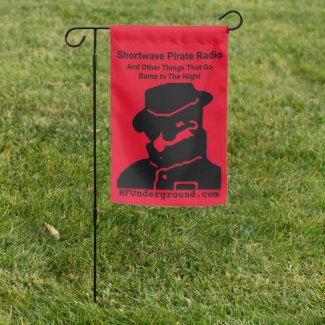...Americans seem to be more savvy than most in this regard, while, at the opposite end of the scale, in some countries, such as my own, the radio culture is generally very poor and people are in the dark.
I get the impression the Dutch and British have a somewhat stronger heritage in radio culture, especially in free or pirate radio.
What I have noticed, however, is that among those who are into shortwave, they tend to be more individualistic and freedom-oriented types as compared to the rest of the population.
Probably true. We don't expect the FCC or any regulatory authority to protect us or tell us what's okay or not okay to hear on radio. The tuning dial takes care of that when we don't care to listen to a particular bit of programming.
Listening to WBCQ and other US shortwave stations, much of the content is either religious or else it is of a rather patriotic and/or libertarian slant and I am wondering if that is indicative of the SW listening public generally.
Not necessarily. While I've listened to many extremist transmissions on radio - religious, political and cultural - I don't necessarily subscribe to any of those beliefs. Similarly, I'm an avid media consumer and lurk equally on ultra-liberal and ultra-conservative websites alike, and everything in between.
My impression is that the typical SWL is a pragmatist in terms of politics and economics, skeptical but tolerant of other's spiritual beliefs, and patriotic but not fanatical regarding their own national identification.
It would also be interesting to see if the personal interests, habits, hobbies etc of shortwave listeners differ from those of the public at large.
We have a higher noise to signal tolerance. Makes it easier to pretend we didn't notice that honeydew list of weekend chores.
Already, I can sense subjective a divide between myself and non-SW listeners. There are few places where I could make an allusion to...
That's true of any niche hobby, interest or community. You see it a lot on tightly knit web communities, where regular participants develop their own jargon and memes. Take a peek at reddit, Something Awful or any other web-based pop culture site and see how long it takes to figure out what anyone is talking about - the communication styles tend to rely heavily on tropes familiar only to regular visitors or participants. And woe unto anyone who carelessly mixes in jargon, catchphrases or memes from a rival site.
I guess there is something romantic in the idea of the SW radio culture being somewhat separate from the mainstream. I wonder if this phenomenon has been studied to any great extent.
I'm not aware of any comprehensive overview, but there are publications that have focused on certain niches within the radio hobby.
For example, Andrew Yoder has written extensively about the shortwave pirate radio hobby. He gets at least some credit/blame for my interest in this particular aspect of SWL. If only I hadn't seen Yoder's books years ago...

If you read enough articles published in Passport to World Band Radio, WRTH and various periodicals you'll get a sense of the diversity in shortwave listening. The hobby is diverse enough that there are many SWLs who know little or nothing about pirate radio; others who listen to almost nothing *except* pirate radio; others whose interest is (or was) confined to major broadcasters like DW, RNW, VOA, BBC, etc.; others who primarily chase numbers and utility stations.
Furthermore, if the sort of moral, philosophical and political messages heard on SW are a case of breaking the mold or preaching to the choir.
Probably neither. Sure, there are some SWLs whose primary reason for listening is to hear messages with which they agree. But as more and more content is available more conveniently online via podcast or streaming audio - or in some cases via local AM/MW and FM radio - I suspect it tends to pare down SWLing to the hobbyists who are in it for the same reason sport fishermen go fishing for fun rather than food, while the more sensible folks buy fish in a grocery store.



